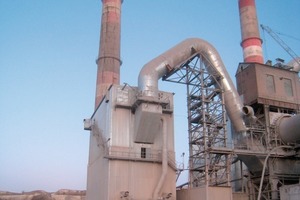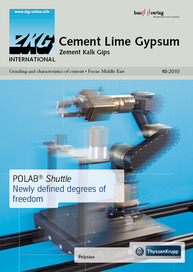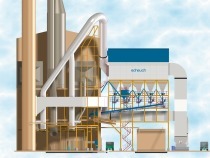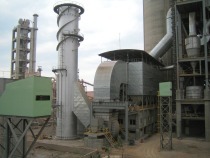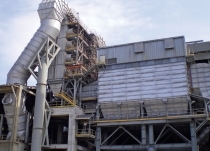Dedusting of wet rotary kilns
Scheuch GmbH of Aurolzmünster/Austria implemented the first wet rotary kiln dedusting system to use EMC filter technology in the year 2003. Since then, the system has operated to the complete satisfaction of the customer, Al Chahba Cement in Aleppo/Syria. In order to meet the requirements of its ambitious environmental philosophy, the Alpha Cement Group decided in 2006 to lower the dust emissions from its three wet rotary kilns operated at Volskcement in Russia’s Saratov region (Fig. 1) to levels at least lower than 10 mg/Nm3.
Rotary valve
After the preparation of a technical study with a call to tender offers, Scheuch GmbH was commissioned to deliver three EMC filtration plants and install these plants on the kiln lines 8-6-7. The scope of delivery included the key components and the engineering for pipe systems, steel structures and platforms. The
so-called take-over point (TOP) was defined as the rotary valve located beneath the filter dust collection point; the customer was responsible for the further transport of dust and the structural requirements starting at this point.
The first wet rotary kiln dedusting system began operating on kiln line number 8 in May 2007. As was subsequently the case for kiln line 6 and kiln line 7, Scheuch installed an EMC filter with filter bags measuring 6000 mm in length and made of fiberglass material with a PTFE coating, making the bags suitable for safe and reliable continuous operation at filter inlet temperatures of up to 250 °C. In order to accommodate short-term temperature spikes experienced when starting the rotary kiln, Scheuch installed a safety flap to supply additional cooling through the admixture of fresh air. From the day it was commissioned, the system reliably complied with clean gas values of < 5 mg/Nm3.
The need to achieve excellent emission limits from the beginning, but also the problem of low kiln output levels caused by the insufficient extraction capacity of the filtration plant, made it necessary for Scheuch’s specialists to collaborate with the customer on a detailed analysis of the problem. It was found that the design data did not agree with the actual operating data because, amongst other things, additional large amounts of ambient air were being sucked into the kiln system through leaks. As a result, the installed fan capacity was no longer adequately dimensioned for these volumes. Through modifications, e.g., a new impeller and a more powerful motor with a frequency transformer, it was possible to increase the fan output by the missing ten percent at low cost. The rotary kiln can now be operated at full capacity.
In contrast to limestone, the raw material used by the Syrian clinker manufacturer, the raw material chalk has an alkali content of up to 30 %. The kiln lines in Russia process this latter material. Because the EMC filter – in contrast to an electrostatic precipitator – also removes these fine chloride particles, the proportion of chloride in the filter dust constantly increased because of the ongoing reintroduction of material into the kiln process. This led to negative consequences that noticeably reduced the kiln capacity. In turn, the filter nozzles became clogged, blocked the further transport of dust and thus reduced the capacity of the kiln. After detailed analyses, Scheuch was able to identify the causes of the problem and work together with the customer to find solutions that eliminated the problem. The percentage of chloride is now continuously monitored by discharging a portion of the filter dust using a reversible discharge screw or by returning all of the filter dust to the rotary kiln - depending on the type of clinker produced – after correctly processing it in a closed-loop system.
In this project, Scheuch was able to gain important new insights that the company is happy to share with customers, both for future plants and also in the event of problems in existing plants. The bag filter system equipped with EMC technology is clearly superior to the electrostatic precipitator for the dedusting of wet rotary kilns. It is the filtration system of the future, particularly with regard to increasingly strict emission limits.
Scheuch GmbH, Aurolzmünster/Austria, Tel.: +43/7752/905-0, Fax: +43/7752/905-370, office@scheuch.com

